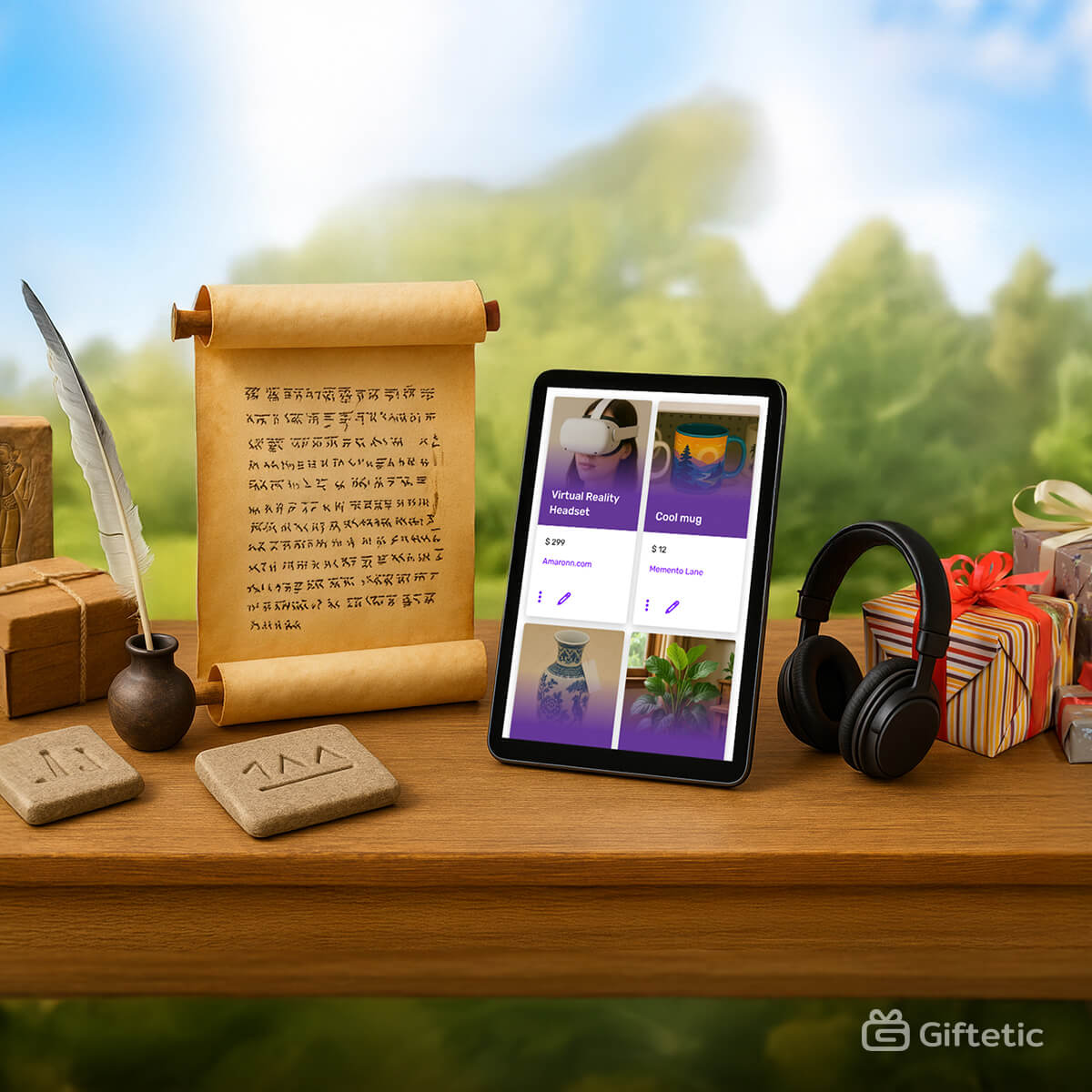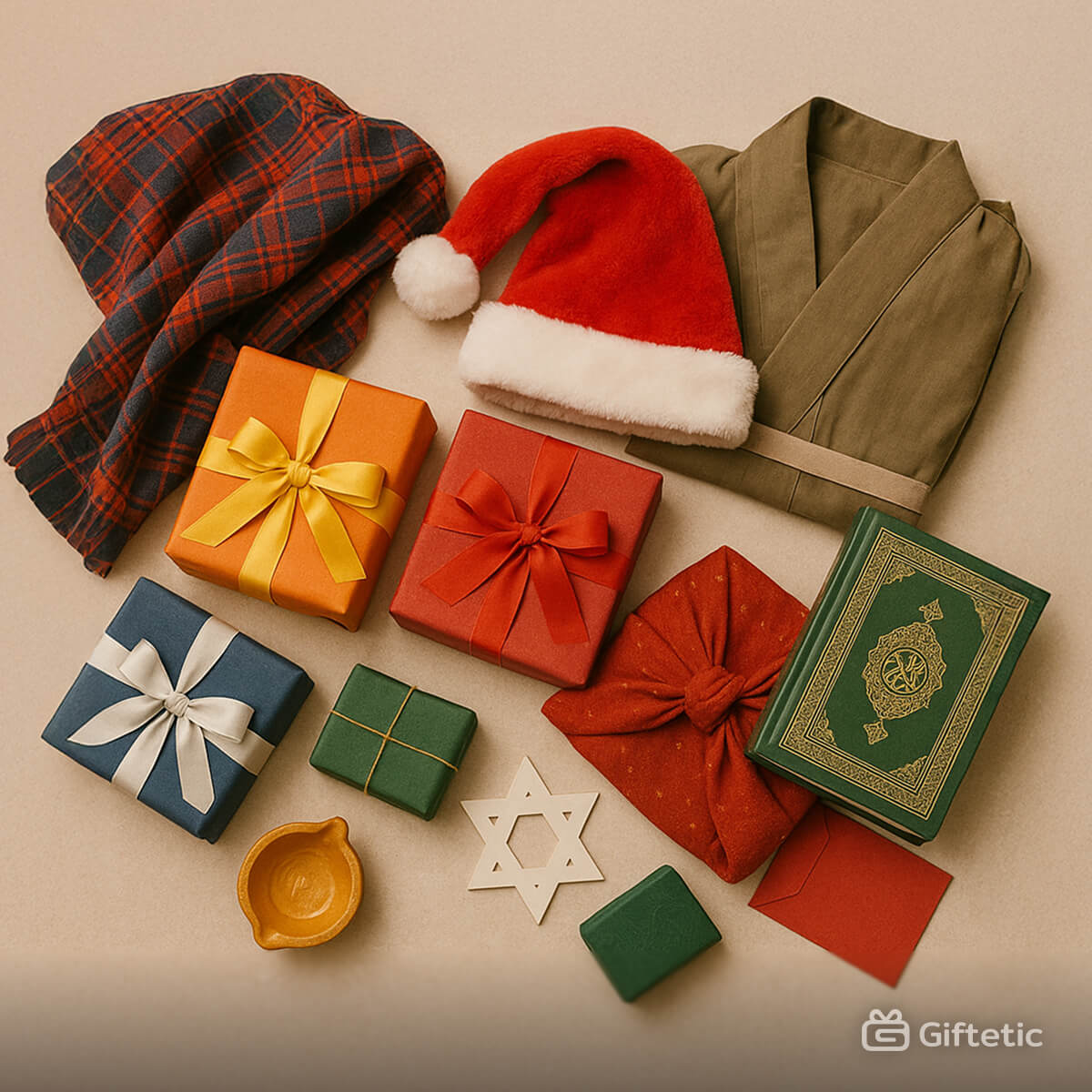Are People Obligated to Buy From My Wishlist? Modern Gift Etiquette and Expectations
Picture this: you've spent hours curating the perfect wishlist, carefully selecting items at various price points, adding thoughtful notes about why each gift matters to you. You share it with friends and family, hoping to make their gift-giving easier. But then comes that nagging question — are they actually obligated to buy from it? The answer might surprise you, and understanding modern gift etiquette around wishlists can transform how both givers and receivers approach the art of thoughtful giving. This transformation happens precisely because wishlists offer profound benefits that extend far beyond simple convenience.
Quick Summary (TL;DR)
No one is obligated to buy from your wishlist — but here's what modern etiquette and psychology reveal:
- The obligation spectrum: Wedding/baby registries carry higher expectations (80-90% compliance) while birthday/holiday lists are suggestions (40-70% compliance depending on relationship closeness).
- For wishlist creators: Share lists as helpful guides, not demands. Include variety in price ranges and always express genuine gratitude regardless of the gift received.
- For gift-givers: Wishlists provide valuable insights into someone's interests — use them as inspiration whether you shop on-list or off-list.
- The giver-receiver paradox: Recipients prefer wishlist items, but givers often get more satisfaction from surprise gifts — understanding this tension helps navigate etiquette.
- Cultural and generational divide: 73% of adults under 30 prefer receiving wishlist gifts vs. only 41% over 60, but older generations stick more strictly to registries when they use them.
- Environmental impact: Wishlist gifts reduce returns by up to 60% and decrease holiday waste, making them more sustainable.
- Digital etiquette matters: How you share, maintain, and communicate about your wishlist affects whether people see it as helpful or demanding.
Why We Give: The Ancient Roots of Gift Exchange
Gift-giving isn't just about the latest gadgets or trendy items — it's one of humanity's oldest social technologies. From the earliest human societies to today's digital wishlists, the act of giving has served as a powerful force for building relationships, establishing status, and creating the social bonds that hold communities together.
Anthropologists have traced gift exchange back tens of thousands of years, finding evidence in archaeological sites from ancient Mesopotamia to early Native American settlements. These weren't casual exchanges — they were serious business that could determine tribal alliances, trade relationships, and social hierarchies that lasted generations.
"Gift exchange is the foundation of human society. It creates obligations, relationships, and social structures that transcend simple economic transactions."
What makes this relevant to your modern wishlist? Understanding these deep psychological and social currents helps explain why gift-giving can feel so loaded with expectations — and why a thoughtfully crafted wishlist can actually reduce anxiety for everyone involved.

Why Do We Give Gifts? The Origins, Evolution, and Meaning Behind Gift-Giving
Gifting HistoryThe Anthropology of Obligation: Give, Receive, Reciprocate
French anthropologist Marcel Mauss identified the three fundamental obligations that govern gift exchange across cultures: the obligation to give, the obligation to receive, and the obligation to reciprocate. This trilogy creates what he called "total social phenomena" — exchanges that bind communities together through networks of mutual obligation and respect.
In traditional societies, refusing a gift could be seen as an act of hostility, while failing to reciprocate might result in social exile. Today's wishlist culture has evolved to address these ancient tensions in surprisingly sophisticated ways. When someone shares a wishlist, they're essentially saying, "Here are gifts I promise to receive graciously," which removes one major source of gift-giving anxiety.
Modern research supports Mauss's observations. A 2023 study by behavioral economists at Stanford University found that gift recipients experience 23% less stress when givers use their suggested items compared to surprise gifts, while givers report feeling 31% more confident about their choices.
Understanding Wishlist Psychology Through Historical Context
To truly understand whether people feel obligated to buy from wishlists, we need to examine the psychological foundations of gift-giving obligation. Historical gift exchange systems reveal patterns that help explain modern wishlist dynamics.
The Trobriand Islanders of Papua New Guinea developed one of history's most sophisticated gift exchange systems — the Kula ring. In this ceremonial network, valuable shell necklaces and armbands circulate in opposite directions among island communities, creating bonds that last lifetimes. What's fascinating is how the Kula system balances obligation with choice: participants must participate, but they have considerable freedom in execution.
"The Kula ring teaches us that successful gift systems require both structure and flexibility — rules that create social bonds without crushing individual agency."
This mirrors modern wishlist etiquette perfectly. There's an understood expectation of participation (bringing a gift), but significant flexibility in execution (which item to choose). Contemporary wishlists function similarly, providing a framework that reduces uncertainty while preserving the personal touch that makes gifts meaningful.
Similarly, the Indigenous potlatch ceremonies of the Pacific Northwest reveal crucial insights about gift-giving psychology. Hosts would give away vast quantities of goods to demonstrate wealth and social status, but the underlying psychology persists today: people often derive more satisfaction from giving impressive gifts than receiving them. This "helper's high" explains why some gift-givers resist wishlists — they want the glory of surprising someone with the perfect unexpected gift.
From Medieval Courts to Modern Wishlists: The Evolution of Gift Guidance
The discomfort some people feel about explicit wishlists isn't new. Throughout history, sophisticated societies have developed elaborate protocols around appropriate gift-giving, revealing that formal guidance has always been necessary for navigating complex social relationships.
Medieval courtly traditions established strict rules about gift exchange between nobles. Knights presenting tokens to ladies followed careful protocols about appropriateness and timing — these weren't spontaneous gestures but choreographed social performances. The Victorian era elevated this to an art form, with detailed advice manuals providing guidance on appropriate gifts for different relationships and occasions.
Religious traditions have also shaped our understanding of obligation versus generosity. Christianity's emphasis on sacrificial love, Judaism's concept of tzedakah, Islam's pillar of zakat, and Buddhism's practice of dana all contribute to how different communities view the duty to give.
"The most meaningful gifts are those that reflect the giver's understanding of the receiver's values and deepest concerns."
This spiritual dimension explains why some people feel uncomfortable with explicit wishlists — they worry about reducing sacred exchanges to transactional commerce. Understanding this context helps explain modern variations in wishlist acceptance.

What Is a Wishlist? Everything You Need to Know About How It Works and Why It Matters
Wishlist BasicsThe Registry Revolution: How Department Stores Changed Everything
The 1920s brought a revolutionary innovation that directly addresses our central question about obligation. When Marshall Field's in Chicago pioneered the wedding registry, they fundamentally reframed "obligation" from a burden into a service.
Early gift registries solved several problems simultaneously: they eliminated duplicate gifts, ensured couples received needed items, and reduced social anxiety for wedding guests. Most importantly, they offered curated options that made generous giving easier and more effective rather than demanding specific gifts.
This philosophical shift laid the groundwork for today's personal wishlist culture. The innovation was so successful because it preserved the fundamental joy of giving while removing the guesswork that often led to disappointment for both parties.

Wishlist vs Gift Registry — What They Are, How They Work, and Key Differences
Wishlist BasicsWhat "Obligation" Actually Means Today
Etiquette experts are remarkably consistent on this point: sharing a wishlist creates no obligation for others to purchase from it. However, there are nuanced expectations around gift-giving occasions that vary significantly by relationship, culture, and context.
The Emily Post Institute, America's leading authority on etiquette, draws clear distinctions between different types of gift-giving occasions. Wedding and baby shower registries carry higher expectations for registry adherence (roughly 80-90% compliance) because these are often needs-based and help establish new households or prepare for major life changes.
Birthday and holiday wishlists, by contrast, are generally viewed as helpful suggestions rather than shopping lists. The expectation is that thoughtful givers will use these lists as inspiration while retaining freedom to surprise, personalize, or select alternatives based on their relationship with the recipient.
"A wishlist should make gift-giving easier, not eliminate the personal touch that makes presents meaningful."
The key insight here is that obligation exists on a spectrum rather than as a binary. Close family members might feel more pressure to stick closely to lists, while distant acquaintances have more latitude for creative interpretation.
Pros and Cons of Wishlist Adherence
Following a wishlist offers clear advantages for both parties. Recipients get items they genuinely want and will use, while givers avoid the stress of guessing and the embarrassment of missing the mark. Environmental benefits are substantial too — wishlist gifts are returned 60% less frequently than surprise gifts, reducing packaging waste and transportation emissions according to EPA data.
But strict registry adherence has downsides. The element of surprise disappears, potentially reducing the emotional impact of gift-opening moments. Some people worry that wishlist culture promotes materialism or makes gift-giving feel transactional rather than heartfelt.
Research from the Journal of Consumer Psychology found that while recipients prefer receiving wishlist items, givers derive more satisfaction from giving surprise gifts — even when those surprises aren't perfectly received. This "giver-receiver asymmetry" explains much of the tension around modern gift etiquette.
The solution lies in balance. Effective wishlist creators include a mix of specific items and general categories, provide price variety, and explicitly welcome creative alternatives. This approach preserves choice for givers while reducing anxiety for everyone involved.
Cultural and Generational Differences
Gift-giving norms vary dramatically across cultures and generations. In many East Asian cultures, the presentation and wrapping of gifts carry as much significance as the contents, making surprise elements particularly important. Scandinavian cultures often emphasize practical, useful gifts that demonstrate thoughtfulness about the recipient's daily needs.
Generational differences are equally pronounced. Baby Boomers often prefer surprise gifts that demonstrate personal knowledge of the recipient's tastes. Generation X grew up with early registries and tends to appreciate the efficiency of wishlist shopping. Millennials and Gen Z have largely embraced wishlist culture, viewing it as considerate rather than demanding.
A 2024 survey by Pew Research found that 73% of adults under 30 prefer receiving gifts from their wishlists, compared to only 41% of adults over 60. However, when it comes to giving, the numbers flip — older generations are more likely to stick strictly to registries, while younger gift-givers often use wishlists as starting points for more creative alternatives.

Popular Holidays When People Give Gifts — Ideas, Tips, and Traditions
Gifting Around the WorldThe Psychology of Wishlist Giving
Understanding the psychology behind gift preferences can help both givers and receivers navigate wishlist etiquette more effectively. Recipients consistently report higher satisfaction with gifts that match their stated preferences, particularly for practical items like household goods, technology, or hobby-related purchases.
However, the psychology shifts for more personal or intimate gifts. Jewelry, clothing, books, or art often carry more emotional weight when chosen personally by the giver, even if the selection doesn't perfectly match the recipient's stated preferences. This explains why many successful wishlists include both specific items and general categories.
"The happiest gift exchanges happen when givers have enough information to make good choices while retaining enough freedom to express their relationship with the recipient."
Smart wishlist creators leverage this psychology by including items that clearly communicate their interests and values while leaving room for interpretation and personalization.
Environmental Considerations in Modern Gift-Giving
Sustainable gift-giving has become a priority for environmentally conscious consumers, and wishlists play a crucial role in reducing waste. The Environmental Protection Agency estimates that Americans generate 25% more household waste between Thanksgiving and New Year's Day, much of it from unwanted gifts and excessive packaging.
Wishlist gifts address this problem directly. When people receive items they actually want, return rates drop significantly, reducing transportation emissions and packaging waste. Additionally, many modern wishlists include options for used, refurbished, or locally-made items that further minimize environmental impact.
Re-gifting has also gained acceptance as an environmentally responsible practice. A 2024 survey by the National Retail Federation found that 57% of Americans consider re-gifting socially acceptable when done thoughtfully, particularly for items that were clearly given with good intentions but don't match the recipient's needs or preferences.
Tracking gift history becomes especially valuable for environmentally conscious gift-givers who want to avoid duplicates and ensure their presents will be appreciated and used.
Host-Guest Dynamics Across Different Occasions
The level of wishlist expectation varies significantly based on the type of celebration. Wedding and baby shower registries carry the strongest social expectations because they often represent genuine needs for major life transitions. Birthday wishlists are viewed more as helpful suggestions, while holiday lists fall somewhere in between.
Housewarming parties represent an interesting middle ground. Hosts often need specific items for their new space, making registries particularly practical, but the social pressure is lower than for weddings. Graduation parties typically involve gifts that celebrate achievement and support future goals, making academic or professional-focused wishlists especially appropriate.
Understanding these contextual differences helps both hosts and guests calibrate their expectations appropriately. A graduation wishlist filled with apartment essentials carries different social weight than a birthday list featuring luxury skincare products.
Practical Etiquette for Wishlist Recipients
Creating and sharing an effective wishlist requires finesse. The goal is providing helpful guidance without creating pressure or appearing entitled. Start by including a variety of price points and types of items — mix practical needs with fun wants, and always include some options under $25.
When sharing your list, timing and tone matter enormously. The most socially graceful approach involves sharing only when asked, or mentioning casually that you maintain a list "to help with gift ideas" rather than presenting it as a requirement. Consider using privacy controls to share different portions of your list with different groups — perhaps showing practical items to parents while sharing hobby-related wishes with friends.
Include helpful notes on your wishlist items, but keep them brief and positive. Instead of "I need this because my old one broke," try "I've been excited to try this brand." These small framing choices make your list feel more like sharing enthusiasms than listing demands.
Always express genuine gratitude for any gift received, whether it came from your list or not. A specific thank-you that mentions how you'll use or enjoy the gift demonstrates that you value the giver's thoughtfulness over strict adherence to your preferences.
Practical Etiquette for Gift-Givers
When someone shares a wishlist with you, view it as insider information rather than a binding contract. The list reveals their interests, values, and current needs — valuable intelligence for selecting a thoughtful gift whether you choose from the list or not.
If you decide to shop off-list, use the wishlist as a guide to their style, preferred brands, or interest areas. This approach helps you avoid common gifting mistakes that can damage relationships, such as giving items that reflect your tastes rather than theirs. Someone whose list includes several novels might appreciate a beautiful bookmark or reading lamp. A list heavy on kitchen gadgets suggests someone who would value a cooking class or gourmet ingredients.
When wishlist items are sold out or beyond your budget, look for related alternatives rather than giving up entirely. Most gift inspiration tools can help you find similar items or complementary products that show you paid attention to their preferences.
For very close relationships, consider combining a wishlist item with a personal touch — perhaps the requested book along with a handwritten note about why you think they'll love it, or the desired kitchen tool with a recipe you're excited to try together.
Returns, Exchanges, and Duplicate Management
Even the most carefully managed wishlists sometimes result in duplicates, sizing issues, or changed preferences. Modern gift etiquette has evolved to handle these situations gracefully, with most people understanding that exchanges are practical rather than personal.
The key to managing returns and exchanges lies in communication and systems. Gift tracking tools can help coordinate among multiple gift-givers to prevent duplicates before they happen. When exchanges do become necessary, handling them discretely and promptly shows respect for the giver's intentions.
Many families have developed informal protocols around duplicate gifts — perhaps keeping one item and exchanging the other for something needed, or using duplicates as future gifts for other occasions. The important thing is maintaining appreciation for the giver's generosity regardless of practical adjustments.
Digital Etiquette for Online Wishlists
Managing online wishlists requires its own set of social skills. Privacy settings, sharing protocols, and update frequency all impact how your list is perceived by potential gift-givers. Most platforms now offer granular privacy controls that allow you to share different list sections with different groups of people.
Regular list maintenance shows consideration for potential givers. Removing purchased items, updating preferences, and adding seasonal options demonstrates that you're actively engaged with your list rather than treating it as a static demand document. Automated reminder systems can help you keep lists current without constant manual oversight.
Social sharing of gifts received requires delicate handling. While it's lovely to acknowledge generous givers publicly, be mindful that posting about gifts from your wishlist might seem to pressure others who haven't yet given, or make those who chose off-list alternatives feel their choices were less appreciated.
This is where platforms like Giftetic can be particularly helpful, offering sophisticated privacy controls and coordination features that make wishlist management feel less transactional and more naturally integrated into your relationships.

Personal Wishlists — Private, Public, or Registry
Manage lists for yourself or anyone else
Giftetic Feature
Frequently Asked Questions
If someone sent me their wishlist, am I required to buy from it?
No, you're not required to purchase from anyone's wishlist. Treat it as helpful guidance about their interests and preferences rather than a shopping mandate. The most important thing is giving something thoughtful that shows you care.
Is it rude to ask for cash instead of physical gifts?
Context matters significantly. Cash requests are increasingly acceptable for major life events like weddings (especially for couples who already live together), graduations, or when saving for specific goals like travel or home purchases. For casual birthdays or holidays, cash requests can seem impersonal unless framed around a specific purpose.
What if I can't afford anything on someone's wishlist?
A thoughtful alternative is always better than going into debt or skipping the occasion entirely. Consider handmade items, charitable donations in their honor, group gifts with others, or selecting something in the same category but at a lower price point. Most people appreciate the gesture more than the specific item.
What if I hate surprises and want people to stick to my list?
Communicate this preference gently but clearly. You might say something like, "I really appreciate when people choose from my wishlist because I have specific needs right now" or "I love knowing I'll use and enjoy every gift." Include plenty of variety in your list to give people options while honoring your preference for predictability.
Should I remove items from my wishlist after receiving them?
Yes, keeping your list current is considerate to potential gift-givers. Most platforms make this easy, and some even allow gift-givers to mark items as "purchased" without revealing who bought what, preventing duplicates while preserving surprise elements.
Templates for Graceful Wishlist Communication
For Sharing a Wishlist:
"I maintain a little wishlist of things I've been hoping to try — happy to share it if helpful for gift ideas, but please don't feel limited by it!"
For Thanking Off-List Gifts:
"Thank you so much for [specific gift]! I love that you thought of [specific detail about why it's perfect]. It's going to be perfect for [specific use]."
For Group Gift Coordination:
"A few of us are thinking of going in together on [item] for [person]. Would you like to contribute? No pressure if it doesn't work for your budget."
For Declining Expensive Gift Requests:
"I love that you thought of me! That's a bit beyond my budget right now, but I'd love to find something special that shows how much I care about [occasion/relationship]."
The Future of Thoughtful Giving
Modern gift etiquette continues evolving as technology, environmental consciousness, and changing social values reshape how we express care for one another. The most successful gift-givers today understand that wishlists are tools for better communication, not replacements for thoughtfulness.
Whether you prefer surprising your loved ones with unexpected delights or carefully selecting from their curated preferences, the fundamental goal remains the same: expressing care, strengthening relationships, and creating moments of joy. Wishlists and gift registries are simply modern tools for achieving these ancient human purposes more effectively.
The families and friend groups that navigate gift-giving most successfully are those that communicate openly about their preferences, respect different approaches to giving and receiving, and remember that the thought behind the gift matters more than perfect adherence to any list or tradition.
"At its best, gift-giving creates connection. Whether that happens through perfect wishlist fulfillment or surprising alternatives matters far less than the intention to bring joy to someone you care about."
As our gift-giving tools become more sophisticated, they enhance rather than replace the human elements of generosity, consideration, and gratitude. Giftetic helps solve the practical challenges of modern gift-giving — from managing privacy settings to preventing duplicates — while preserving the genuine desire to celebrate and care for the people who matter most to us. The heart of meaningful gift exchange remains our connections with others, but smart tools make those connections easier to express thoughtfully.



![Man opening a birthday gift box that explodes with sparks at a garden party — representing gifting mistakes that can damage relationships, featured in [APP_NAME]’s blog on common gift-giving errors and how to fix them.](/images/articles/blog/gifting-and-relationships/16/common-gifting-mistakes-that-damage-relationships-and-how-to-fix-them.jpg)

